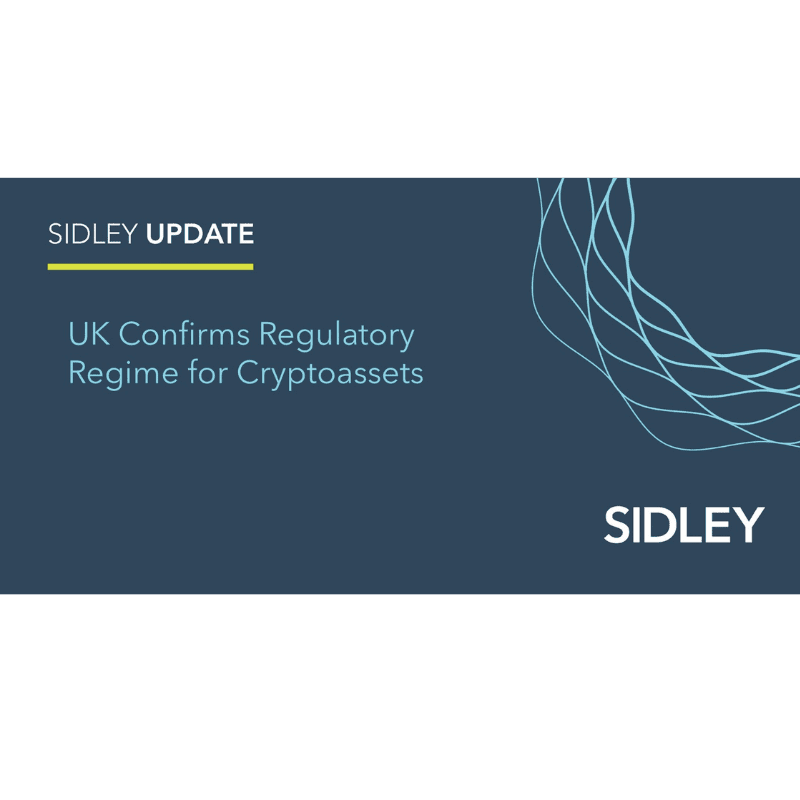
Key Takeaways Phase 1 — Regulation of fiat-backed stablecoins
Managing the failure of systemic digital settlement asset firms
Phase 2 — Regulation of other categories of cryptoassets
Position of firms registered under the UK Money Laundering, Terrorist Financing, and Transfer of Funds (Information on the Payer) Regulations 2017 (MLRs)
|
On October 30, 2023, the UK government published its plans to legislate for the future financial services regulatory regime for cryptoassets. In this Sidley Update, we look at the following:
Phase 1
Managing the failure of systemic DSA Firms
Phase 2
PHASE 1
Background
The Financial Services and Markets Act 2023 (FSMA 2023), which amends FSMA 2000, paved the way for the regulation of stablecoins. It allows the government to bring certain activities relating to fiat-backed stablecoins within scope of regulatory authorisation and various ongoing requirements that apply to other financial services.
Phase 1 regulation will have a significant impact on firms that issue, custody, or facilitate transactions in fiat-backed stablecoins and may require changes to business models. The requirement for authorisation is a high barrier to market entry or continued market access for firms that are not currently regulated under FSMA or the PSRs. It will likely take significant time and resources for firms required to seek such authorisation with no guarantee that their applications will be approved.
Definition
The government expects to define fiat-backed stablecoins as “a cryptoasset that seeks or purports to maintain a stable value by reference to a fiat currency and by holding fiat currency, in whole or in part, as backing.” This will not be limited to particular currencies or single-currency stablecoins.
The government has confirmed that tokenised deposits will not be within scope of the Phase 1 reforms as it considers they are already covered under the regulated activity of “accepting deposits,” for which regulated banks are authorized. This does however call into question the scope of activities that non-banks will be permitted to carry on in relation to tokenised deposits.
Activities relating to algorithmic and commodity-backed stablecoins are not within scope of Phase 1, but certain activities in relation to these types of stablecoins will be regulated as part of Phase 2.
Scope
Issuance and custody of fiat-backed stablecoins
The issuance and custody of fiat-backed stablecoins will be regulated by the FCA under FSMA.
Payments
The use of fiat-backed stablecoins as a means of payment will be regulated by the FCA under the PSRs for:
FCA discussion paper on the regulation of fiat-backed stablecoins
Requirements for backing assets
The FCA has proposed in its discussion paper that issuers of stablecoins at all times hold backing assets that are (i) equivalent in value to the issued stablecoins, (ii) stable in value, and (iii) sufficiently liquid and supported by adequate safeguarding arrangements to allow customers to promptly redeem their stablecoins.
Firms will be required to hold backing assets on statutory trust and will be subject to recordkeeping requirements. The FCA is proposing to apply the regime set out in its Client Assets sourcebook (CASS) to situations where there is a discrepancy between the value of the backing assets and the value of issued stablecoins.
Ban on paying interest on stablecoins
Issuers will also be prevented from paying interest on stablecoins.
Territorial scope of Phase 1
Under the proposed secondary legislation, the FCA will be able to make rules for the issuance and custody of fiat-backed stablecoins issued in or from the UK.
The PSRs will apply to transactions in fiat-backed stablecoin where (i) at least one leg of the transaction takes place in the UK and (ii) the transaction is facilitated by a UK firm regardless of where the transaction takes place.
Overseas stablecoins
The UK government is also considering the use of overseas stablecoins in UK payment chains. HM Treasury is exploring whether to create a new regulated activity of “payment arranger” under the PSRs. A payment arranger would have to assess and approve any overseas stablecoin before the overseas stablecoin can be used in UK payment chains.
The FCA has suggested that payment arrangers be required to assess overseas stablecoins against standards equivalent to those that will apply to fiat-backed stablecoins issued in the UK.
Other matters
In addition, the FCA is seeking views on:
Next steps for Phase 1
Responses to the FCA Discussion Paper must be submitted by February 6, 2024.
The government intends to introduce secondary legislation for Phase 1 by early 2024, subject to available parliamentary time.
The government intends to initially lay the implementing regulations for the systemic DSA firms regimes when parliamentary time allows. This will be followed by rules on the operation of the amended FMI SAR (see below).
MANAGING THE FAILURE OF SYSTEMIC DIGITAL SETTLEMENT ASSET FIRMS
The government has published its response to its earlier consultation on managing the failure of systemic DSA Firms, which use digital settlement assets including fiat-backed stablecoins.3
The definition of digital settlement asset is:
a digital representation of value or rights, whether or not cryptographically secured, that—
(a) can be used for the settlement of payment obligations,
(b) can be transferred, stored, or traded electronically, and
(c) uses technology supporting the recording or storage of data (which may include distributed ledger technology).
This will capture, among other things, fiat-backed stablecoins.
The government has confirmed that:
PHASE 2
Phase 2 will broaden the range of cryptoassets subject to UK regulation beyond the fiat-linked stablecoins covered under Phase 1. The Phase 2 Consultation Response is broadly consistent with the UK government’s previous proposals for the regulation of cryptoassets under this phase, although there are certain important developments, which we discuss below.
The Phase 2 proposal is similar to the EU’s Markets in Cryptoassets Regulation (MiCAR), but there are points of difference (see further our previous Sidley Update on Phase 2).
Regulation of a broader range of cryptoassets
The Consultation Response confirms that firms carrying out regulated activities involving cryptoassets by way of business will need to be authorised under the regulatory regime for financial services set out in FSMA. This will be done by expanding the list of “specified investments” that relate to a “specified activity” in the Financial Services and Markets Act 2000 (Regulated Activities) Order 2001.
The UK government has acknowledged that the proposed definition of “cryptoasset” is intentionally broad to future-proof it against cryptoassets that do not yet exist. Notably, the precise distinction between tokens that are in and out of scope will be set out in secondary legislation and FCA rules. As such, firms should assume at this stage that a broad range of cryptoassets could be brought within scope of UK regulatory requirements.
However, the Phase 2 Consultation Response indicates that cryptoassets will generally be subject to the regulatory regime only where they are used (i) for one of the regulated cryptoasset activities (see below) or (ii) otherwise qualify as a financial services instrument, product, or investment.
Which cryptoasset activities will be regulated under Phase 2?
In line with the consultation, the UK government has confirmed that the following activities will be within scope of the new authorisation regime for cryptoasset activities:
Territorial scope of Phase 2
Under the existing financial services authorisation regime, the Overseas Person Exclusion (OPE) applies to certain regulated activities and enables “overseas persons” to provide services to UK customers without those firms requiring authorisation in the UK.4
However, the UK government has confirmed that the OPE will not apply in relation to regulated cryptoasset activities. This marks a departure from the current position for non-UK firms that provide non-cryptoasset services to customers in the UK on a cross-border basis, which will be brought within scope of the new authorisation requirements.
Notably, the Consultation Response focuses on firms “dealing directly with retail consumers.” As such, it remains to be seen whether institutional clients could be exempt from authorisation.
Separately, the consultation sought to exempt non-UK firms from authorisation when providing services to UK customers from outside the UK on a “reverse solicitation” basis, that is, where services are provided entirely at the initiative of the UK customer. However, the “reverse solicitation” exemption is not mentioned in the Consultation Response, which raises the question as to whether this proposal has been withdrawn for Phase 2.
Non-fungible tokens (NFTs) and utility tokens
The Consultation Response confirms that NFTs will generally fall outside of scope of Phase 2. However, an NFT could fall within scope of Phase 2 where its features enable it to be used for a regulated cryptoasset activity (see above). Similarly, the assessment of utility tokens under Phase 2 will depend on how they are used.
Disclosure requirements
The UK government has confirmed its approach regarding disclosure requirements for cryptoassets made available for trading on a UK trading venue. Such disclosure requirements will apply in respect of both (i) well-established tokens with “relatively high levels of liquidity and at least several years of trading history” and (ii) those “which do not have a clearly identifiable issuer — e.g., Bitcoin.” The Consultation Response indicates that the flow of cryptoassets without an identifiable issuer will likely be limited where they are issued after the disclosure regime comes into force. It remains to be seen how the government will impose liability for failure to comply with the relevant disclosure requirements where there is no clearly identifiable issuer for existing cryptoassets such as Bitcoin.
Notably, the government considers that trading venues which only admit institutional investors should be subject to less prescriptive disclosure requirements.
Market abuse regime
The UK government has confirmed that a dedicated market abuse regime will apply to cryptoassets admitted (or requested to be admitted) to trading on a UK cryptoasset trading venue. In practice, this means many cryptoasset firms will have to develop policies and procedures to manage price-sensitive information relating to cryptoassets.
A similar market abuse regime will apply under MiCAR.
Decentralised finance (DeFi)
DeFi poses a regulatory challenge as regulators cannot readily identify and hold accountable the persons who effectively control the DeFi arrangements. The government acknowledges that “it would be premature and ineffective for the UK to regulate DeFi activities currently.” Accordingly, the government does not intend to ban DeFi.
Next steps for Phase 2
The UK government intends for the Phase 2 secondary legislation to be laid before Parliament for deliberation in 2024, subject to available parliamentary time.
Note on cryptoasset businesses registered under the MLRs
Currently, “cryptoasset exchange providers” and “custodian wallet providers” that provide services in the UK must be registered with the FCA and comply with certain obligations under the MLRs, including customer due diligence.
The new authorisation regime for regulated cryptoasset activities will be broader than the MLRs registration regime, and firms registered under the MLRs regime will not be automatically authorised under the new regulatory regime for cryptoasset activities under Phase 1 or Phase 2. Firms will need to become authorised under FSMA (or apply for a Variation of Permission) or the PSRs, as applicable, to enable them to perform the newly regulated cryptoasset activities.
What should firms do next?
Firms providing, or planning to provide, services in relation to fiat-backed stablecoins or cryptoassets in scope of Phase 2 in the UK or to UK customers should consider how the points discussed above may affect their businesses and whether the changes could create opportunities or risks. Based on these considerations, firms may wish to engage with the UK government and regulators directly or through trade associations.
1On-ramp means the process of exchanging fiat currency (e.g., U.S. dollars) for cryptoassets.
2Off-ramp means the process of exchanging cryptoassets for fiat currency.
3This would mean the FMI SAR applies to (i) operators of recognised systemic DSA payment systems under s.112(2)(a) of the Financial Services (Banking Reform) Act 2013, (ii) recognised DSA service providers to DSA payment systems (whether or not themselves systemic) under s.112(2)(aa), as well as (iii) non-systemic service providers to recognised systemic DSA payment systems that HM Treasury has designated under s.112(2)(c).
4The OPE is an exemption from the requirement to be authorised under FSMA and allows some services that would otherwise trigger an authorisation requirement to be provided to UK customers on an unregulated basis. The OPE applies to the provision of certain services that would otherwise be regulated by a person who does not do so, or offer to do so, from a permanent place of business maintained by that person in the UK.
Sidley Austin LLP provides this information as a service to clients and other friends for educational purposes only. It should not be construed or relied on as legal advice or to create a lawyer-client relationship. Readers should not act upon this information without seeking advice from professional advisers.
Attorney Advertising—Sidley Austin LLP, One South Dearborn, Chicago, IL 60603. +1 312 853 7000. Sidley and Sidley Austin refer to Sidley Austin LLP and affiliated partnerships, as explained at www.sidley.com/disclaimer.
© Sidley Austin LLP
 Max Savoie (Partner)
Max Savoie (Partner)
 Leonard Ng (Partner)
Leonard Ng (Partner)
 Martin Dowdall (Senior Managing Associate)
Martin Dowdall (Senior Managing Associate)
 Paida Manhambara (Managing Associate)
Paida Manhambara (Managing Associate)







Log in to access complimentary passes or discounts and access exclusive content as part of your membership. An auto-login link will be sent directly to your email.
We use an auto-login link to ensure optimum security for your members hub. Simply enter your professional work e-mail address into the input area and you’ll receive a link to directly access your account.
Instead of using passwords, we e-mail you a link to log in to the site. This allows us to automatically verify you and apply member benefits based on your e-mail domain name.
Please click the button below which relates to the issue you’re having.
Sometimes our e-mails end up in spam. Make sure to check your spam folder for e-mails from The Payments Association
Most modern e-mail clients now separate e-mails into different tabs. For example, Outlook has an “Other” tab, and Gmail has tabs for different types of e-mails, such as promotional.
For security reasons the link will expire after 60 minutes. Try submitting the login form again and wait a few seconds for the e-mail to arrive.
The link will only work one time – once it’s been clicked, the link won’t log you in again. Instead, you’ll need to go back to the login screen and generate a new link.
Make sure you’re clicking the link on the most recent e-mail that’s been sent to you. We recommend deleting the e-mail once you’ve clicked the link.
Some security systems will automatically click on links in e-mails to check for phishing, malware, viruses and other malicious threats. If these have been clicked, it won’t work when you try to click on the link.
For security reasons, e-mail address changes can only be complete by your Member Engagement Manager. Please contact the team directly for further help.